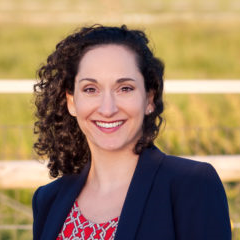Lauren Handel

Law Firm:
Handel Food Law, NJ
- Practices regulatory compliance, commercial contracts, litigation, intellectual property law
- Licensed to practice in New York, New Jersey, and Maryland
- Represents farmers, restaurant owners, food manufacturers and distributors
Lauren says:
“The first thing to think about is, what interests you the most?”
From Big Law To Food Law
Food law was a career change for Lauren Handel, but she doesn’t regret any of the steps that got her there. Lauren began her career in a large firm doing mostly litigation work, and while she learned a lot and honed her legal skills there, she eventually began to feel that she wasn’t pursuing her passion. Around 2006, when Michael Pollan’s Omnivore’s Dilemma was published and the food movement began to be more visible, Lauren realized that she connected with that movement. She says that she loves activities around food—eating, cooking, going to restaurants—and when she first decided to change careers, Lauren’s goal was to start a local food distribution business. As she was coming to terms with how large an undertaking this would be, she read a blog post that inspired her and helped her to realize that she could support the food movement doing what she already did—being a lawyer. Lauren began to network and learn about the field, and went back to school to earn an advanced degree in Agricultural and Food Law. She began her food law practice in 2013, initially in partnership with another lawyer, and then launched Handel Food Law in 2016.
Lauren serves an array of clients across the food system—from restaurants and farmers to manufacturers and distributors. Many of her clients are brand owners or otherwise involved in packaged products. She describes her work as “fairly general practice for a small, food-focused firm.” About half of Lauren’s work is regulatory compliance—which mostly involves helping her clients navigate regulations around labeling and marketing, as well as minimizing the risks of lawsuits for false or misleading advertising. The other half is small business practice, including trademarks, contracts, and disputes.
Practice And Plan
Lauren credits her early experience at the large law firm with helping her build a good foundation in “being a lawyer.” During those years, she developed expertise in issue-spotting, client counseling, and litigating. She credits her education—the Master of Laws in Agricultural and Food Law that she earned from the University of Arkansas in 2013—with introducing her to the wide realm of food and agriculture law and the resources to work in it. But she says that her expertise really “comes from practice”—from her years of on-the-ground work, from encountering real-life issues and challenges and working through them, and from continuing to learn as she practices every day.
Although Lauren admits with a laugh that this is not what she did, she advises attorneys interested in this field of practice to “try to plan early and be intentional.” Because there are so many ways to practice food and agriculture law, she says it’s important to “think thoroughly and hard” about what’s really interesting in the field, and then to make a plan to get there. She recommends that new attorneys talk to practitioners, and take internships to get practice as well as to test that they really are interested in what they think they are. She also notes that it’s important to recognize that “changes may happen along the way.”
The Center for Agriculture and Food Systems is an initiative of Vermont Law School, and this toolkit provides general legal information for educational purposes only. It is not meant to substitute, and should not be relied upon, for legal advice. Each farmer’s circumstances are unique, state laws vary, and the information contained herein is specific to the time of publication. Accordingly, for legal advice, please consult an attorney licensed in your state.
